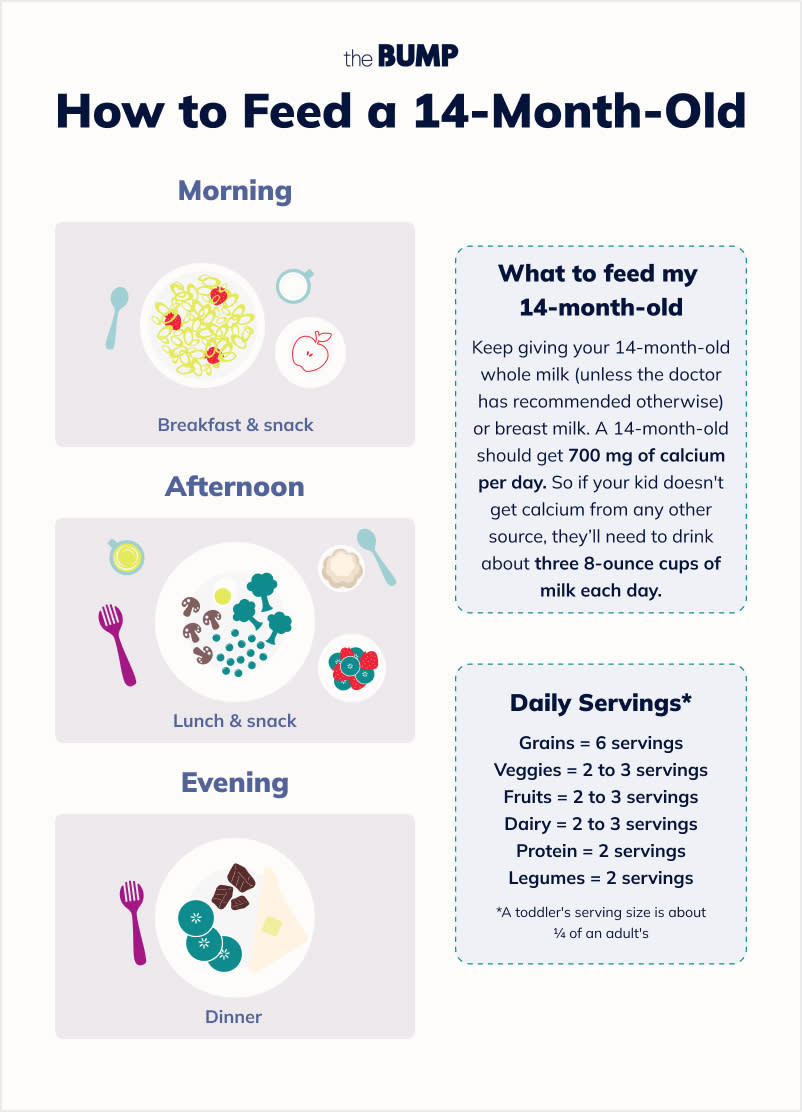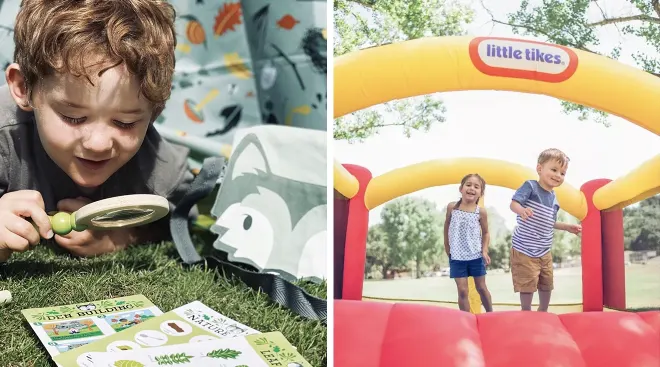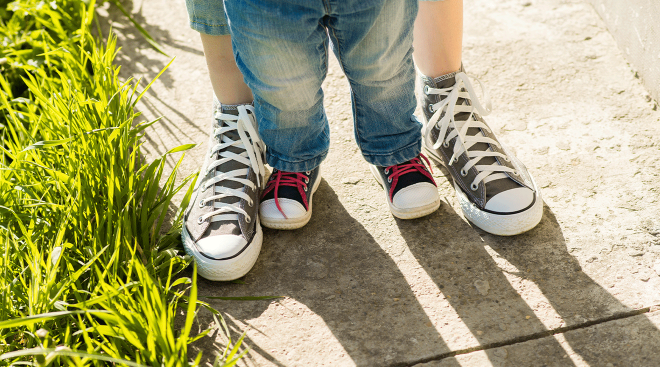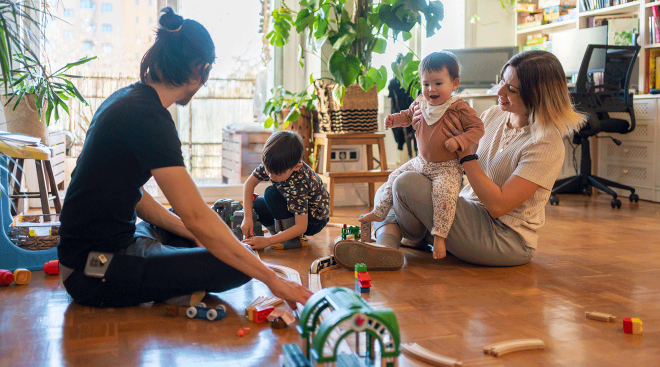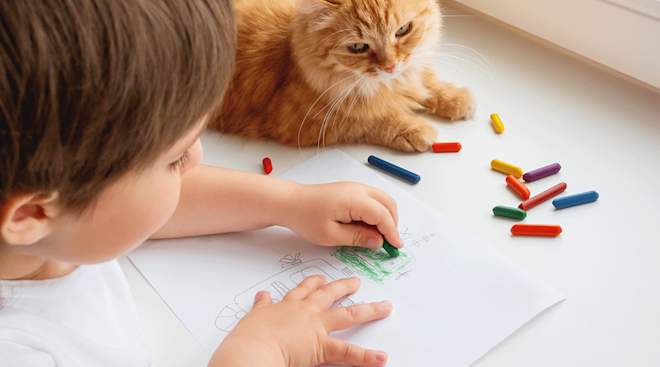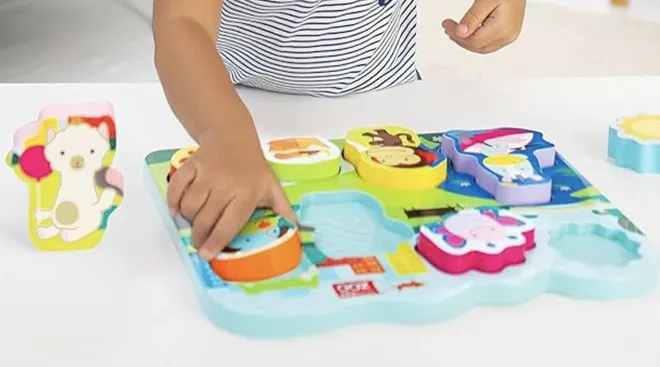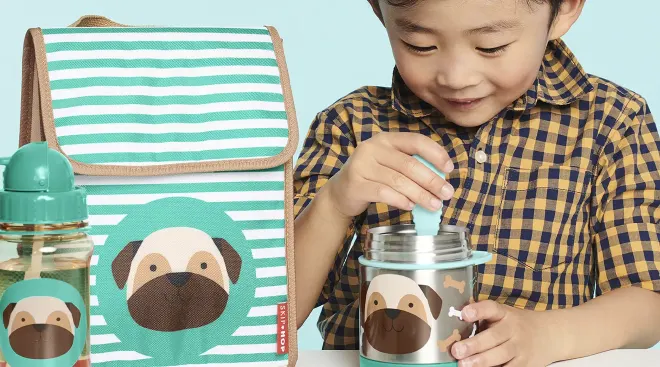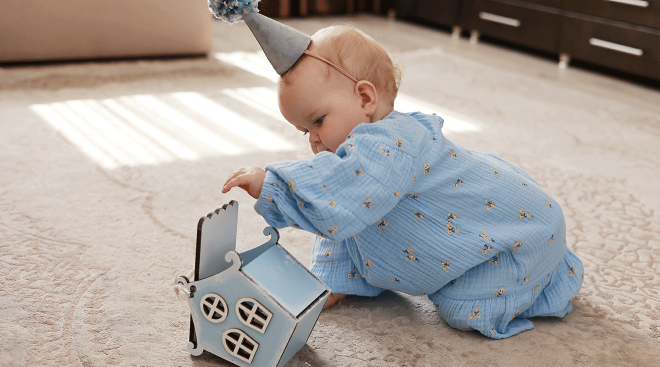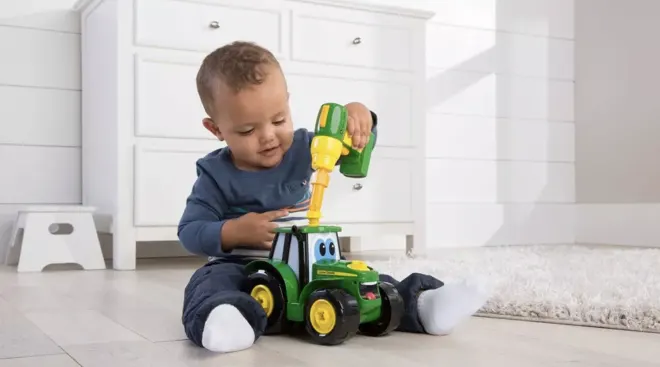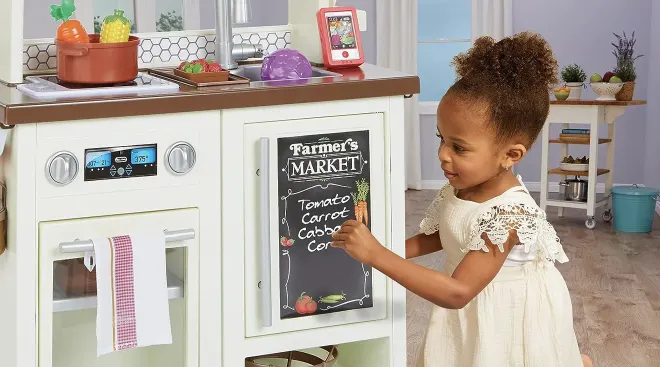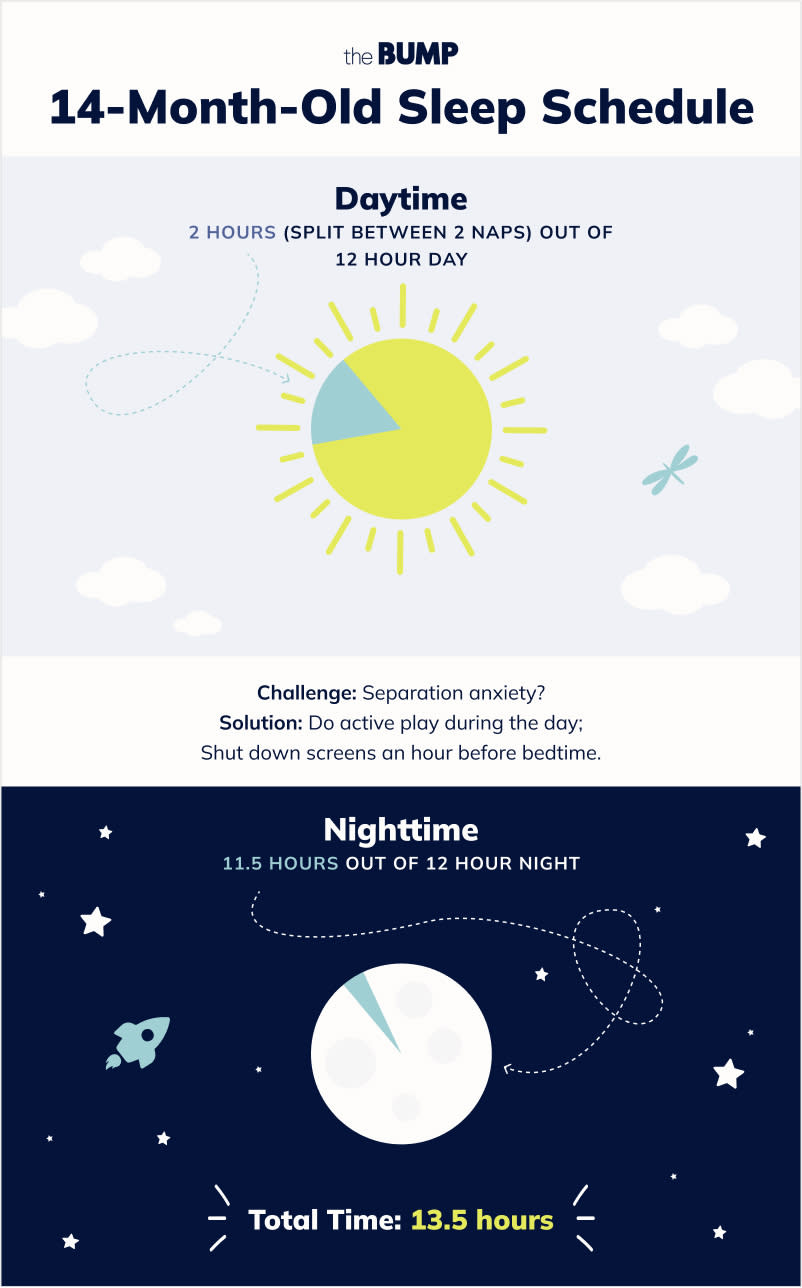Your 14-month-old may be practically running or may still be summoning the courage for those first steps. Expect bumps, splats and somersaults, since depth perception and coordination take a while to develop. When your toddler tumbles, your reaction can have a big effect on theirs. If you ignore minor falls—or even clap and say “nice one!”— you may avoid the tears and drama. You might also notice bowlegs, flat feet or their toes pointing out when they walk. These are common at 14 months and should disappear later.
Your 14-month child is gaining pounds, inches and a variety of new skills.
14-month-old weight and height
How much should a 14-month-old weigh and measure? According to the World Health Organization, average weight for a 14-month-old is 20.7 pounds for girls and 22.3 pounds for boys. Average height is 30.1 inches for girls and 30.7 inches for boys.
It's not the weight and height that matters though—it's that your child's rate of growth is healthy. Your child is probably gaining about a half pound and growing about a half inch per month. Next month, at the 15-month checkup, your pediatrician will check how they’ve been growing to make sure it's on track.
14-month-old milestones
Your toddler's working on a ton of skills. These are a few 14-month-old milestones that are probably on your mind.
- Walking. Most 14-month-olds can stand by themselves and take a few steps without help. About half are good walkers. A few ambitious tots are running and maybe even climbing steps at this age.
- Speech. Your 14-month-old is probably saying mama and dada and may even say up to six or so words.
- Teething. Some 14-month olds may be erupting their first molars. Many kids find relief from teething pain with cold (but not frozen!) teething rings. It's okay to give your child acetaminophen or ibuprofen to make them more comfortable when teething is at its worst.
- Potty training. Wondering whether your 14-month-old is ready to potty train? The answer is probably no. While there’s no general consensus among doctors on when is the ideal time, they all agree: your toddler will usually give you signs when they’re ready. Many pediatricians will bring this topic up for discussion at the 2-year-old visit, so you have plenty of time. Still, it's never too early to start talking about the potty with your child and reading books about using it.
What should a 14-month-old baby be able to do?
When it comes to 14-month-old milestones, there are some fine motor skills your little one is actively working on. Your 14-month-old baby should be able to let go of an object and pick it up again. They’ll love to practice throwing a ball. Your 14-month-old grasps the concept of object permanence; have them place small objects in a container and remove them again. They’ll be turning the pages of board books on their own and starting to make marks on paper if given a crayon to draw with. You’ll also see your 14-month-old baby pointing. They want to climb, so make sure they have a safe play space.
What should my 14-month-old be saying?
When it comes to 14-month-old milestones, speech development can vary quite a bit. Your toddler may only be able to say a few words at this stage, but they can understand much more. They’ll be working on mimicking sounds and speech patterns and will be able to understand basic directions like “get your shoes.” If baby is saying a few words at this point, they’re right on track!
14-month-old behavior
Your 14-month-old baby is getting more social and starting to develop lots of opinions. Those opinions also mean they’ll start to become a little more particular about things and might exhibit bad behavior when they don’t get their way. Offer your 14-month-old two choices when possible to minimize power struggles. It’s best to ignore behavior you’d like to discourage and give attention to the behavior you want to encourage.
- Tantrums. If your sweet baby is prone to a meltdown from time to time, chalk it up to normal toddlerhood. A kid's most likely to throw tantrums between 1 and 3 years, so you've got a good year (at least) left to deal with these fits. In the meantime, make "stay calm" your mantra.
- Separation anxiety. Your little one is becoming more independent every day but they may, at times, also be more sensitive to being away from you. If drop-off at daycare or Grandma's house is tearful, stay consistent in your routine, assure your toddler you'll be back and give them lots of attention after you return. The tears stop soon after you leave.
- Signs of autism. A common concern for parents of toddlers is whether or not their child could have an autism spectrum disorder (ASD), since autism can become apparent during the toddler and preschool years. Kids with autism may have atypical communication, social skills and behaviors; they may not hit 14-month-old milestones at the same age as other children or they may lose some skills they previously had. Your child's pediatrician will likely ask you a series of questions to evaluate for signs of autism at their 18-month checkup. But if you have concerns now, it's worth an earlier discussion.
- Biting. Got a biter on your hands? Don’t worry: Biting is actually a really common phase for toddlers and won’t last too long. Since they can’t communicate emotions, particularly frustration, they bite. You’ll find that most other parents are understanding—but do make it clear to your little one that biting isn't acceptable.
When your 14-month-old is sick, you're going to want to consult your child's pediatrician to find the best treatment. A few common health questions parents have at this age are:
- My 14-month-old has a fever. What should I do?
- My 14-month-old has diarrhea. What should I do?
- My 14-month-old is throwing up. What should I do?
Your 14-month-old is probably eating more new foods—but may be rejecting some favorites they previously loved. Don't let that keep you from offering them though; they’re really still figuring out which foods they love and which ones they don’t care for.
How much should my 14-month-old be eating?
A 14-month-old baby should be eating about three meals and two snacks per day. Give them a daily variety of foods in all food groups—vegetables, fruits, grains, protein and dairy.
Doctors say most toddlers need approximately 1,000 calories per day—give or take—or about 40 calories for each inch of their height. But definitely don't worry about keeping track! Offer your one-year-old portions about one-fourth the size of an adult portion. Then, let them choose how much they eat based on their appetite.
What to feed a 14-month-old
Keep giving your 14-month-old whole milk (unless the doctor has recommended otherwise) or breast milk. A 14-month-old should get 700 mg of calcium per day. So if your kid doesn't get calcium from any other source, they’ll need to drink about three 8-ounce cups of milk each day.
As far as food choices go, variety is key. Just like you, your toddler should be eating a variety of foods from all the different food groups. At this age, you don't need to restrict fats—because a 14-month-old needs them for brain development—but you should definitely avoid giving them overly salted foods and sugary snacks. Stick with natural, unprocessed foods as much as possible.
Need 14-month-old baby food ideas? Most 14-month-olds are able to pick up foods and feed themselves. But they're still at risk for choking, so continue to mash foods or keep pieces very small and easy to chew. Foods like peanuts, whole raw carrots and hard candies are still too hard for a 14-month-old. Grapes and cherry tomatoes should be cut into very small pieces to prevent choking.
14-month-old won’t eat
You probably already know that toddlers are notorious for being picky eaters. But that doesn't help when meals go untouched, and you start to worry about your child's health. Here’s the thing: every kid is going to eat something eventually. Experts say to think of your toddler's nutrition in terms of weeks, not days. So if your child seems to have eaten a variety of foods over the course of the week—and there are no problems with their weight gain or growth—then everything's probably A-OK.
14-month-old feeding schedule
*A toddler's serving size is about ¼ of an adult's
At 14 months, the name of the sleep game is routine. You'll want to make sure your child has a pretty set schedule so they know when they’re expected to settle in for the night. Of course, there are always going to be days where things don't go exactly as planned.
How much sleep does a 14-month-old need?
One- to 2-year-olds should get 11 to 14 hours of sleep per day total, between nighttime sleep and one or two daytime naps.
14-month-old sleep regression
Vivid dreams, teething pains and separation anxiety are just a few reasons a 14-month-old can start to wake at night—even if they were previously a good sleeper. If you're desperate to get back to the usual sleep routine, it's important to know the root of the problem, so you can help your child get through this sleep disruption. Stick with the usual bedtime routine and set limits that will help your child get back on track.
14-month-old won’t sleep
You've probably become (very groggily) aware that you can't force kids to sleep. If your 14-month-old refuses to sleep at bedtime, the only thing you can do is provide the tools they need to start snoozing — and then let them decide to actually do it. This means giving plenty of opportunities throughout the day for active play, setting a bedtime routine that's predictable and calming and shutting down screens at least an hour before bedtime.
14-month-old sleep schedule
Here's one example of how it might look:
Now that your 14-month-old is much more upright and mobile than they used to be, they’re probably really into playing while sitting, standing and walking. Just check out their new moves! Looking for things to do with a 14-month-old? Here are some fun activities, games and toys:
- Patty-cake. At 14-months-old, toddlers love to imitate grown-ups when they clap their hands.
- Push toy. Mini lawn mowers, shopping carts and strollers are great toys for this age, since new walkers love to show off their skills while pushing along.
- •Stacking blocks. Your child can start to learn to build a tower with two blocks; eventually, they'll want to add even more.
- Shape sorting. Matching shapes to the holes in a shape-sorting toy is a fun skill for a 14-month-old to begin to master.
- Pretend-play toys. Put that budding imagination to work with play kitchens, fake phones, dolls and toy cars and trucks.
- Keep giving your 14-month-old a child-size cup, spoon and/or fork to practice using them during mealtime. It might be messy now, but give your kid time to get the hang of them.
- Your mini-me may be digging into—and emptying—everything in reach (boxes, bags, trash cans, your purse). Keep anything messy or dangerous out of reach.
- Make clean-up fun by putting on some music and singing together while you put toys away together.
- Set aside time for reading, singing and playing with your 14-month-old baby every day. This is not only fun for them, it’s enjoyable for you too! What’s more, these activities help your little one learn new words and will get them closer to hitting all those 14-month-old milestones.
- Climbing is all the rage at 14 months old. Find a safe and age-appropriate playground to take your little to. Also make sure that furniture and other climbable items at home are secure.
- Keep baby in a rear-facing car seat until they reach the weight and height limit for their specific car seat.
- Be consistent with your 14-month-old’s dental care. Brush baby’s teeth with a soft, child-size toothbrush and a dab of fluoride children’s toothpaste the size of a grain of rice. Your child likely had their first dental visit when they turned one.
- Protect baby’s skin and eyes when you play outside by encouraging them to wear a protective hat and applying sunscreen to their delicate skin; apply it 15 to 30 minutes before heading outside and every two hours while outdoors (or sooner if baby’s been sweating or swimming).
Your 14-month-old is a mini mover and shaker. They’ve got places to go, people to see and skills to master. Enjoy this exciting period of development; your toddler is growing up fast!
Please note: The Bump and the materials and information it contains are not intended to, and do not constitute, medical or other health advice or diagnosis and should not be used as such. You should always consult with a qualified physician or health professional about your specific circumstances.
Navigate forward to interact with the calendar and select a date. Press the question mark key to get the keyboard shortcuts for changing dates.


































